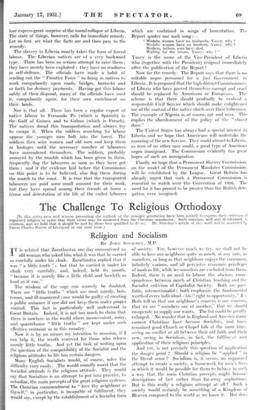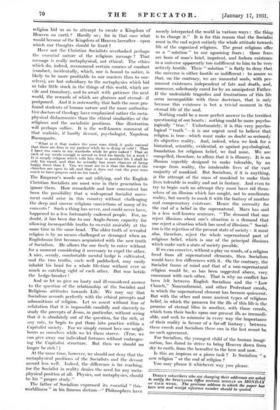The Challenge To Religious Orthodoxy [Tn this series men and
women presenting the outlook of the younger generation have been invited to express their criticism of organized religion in order that their views may be answered from the Christian standpoint. Such criticism, well and ill-informed, L4 common, and we hold that it should be met by those best qualified to do so. Mr. Strachey's article of this week will be answered by Canon Charles Raven of Liverpool in our next issue.]
Religion and Socialism
By JOHN STRACHEY, M.P.
1T is related that Zarathustra one day encountered an 7. old woman who asked him what it was that he carried so carefully under his cloak. Zarathustra replied that it was " a little truth " ; but that he carried it under his cloak very carefully, and, indeed, held its mouth, "because it is unruly like a little child and bawleth as loud as it can."
The wisdom of the sage can scarcely be doubted. There are " little truths" which are most unruly, bois- terous, and ill-mannered ; one would be guilty of creating a public nuisance if one did not keep them under proper control. This fact is particularly well understood in Great Britain. Indeed, it is not too much to claim that there is nowhere in the world where inconvenient, noisy, and quarrelsome " little truths " are kept under such effective restraint as in this country. it ts ybtyleiReniNi%51171..ai means Tin:1r eems reserved v intention erfnooturi on ndlyt those a s so occasion, ease unruly little truths. And yet the task of writing upon can the question of the compatibility of the Socialist and the religious attitudes to life has certain dangers. Many English Socialists would, of course, solve the itrh Socialist attitude is the religious attitude. They would say that Socialism is an attempt to put into practice, to actualize, the main precepts of the great religious systems. The Christian commandment to "love thy neighbour as thyself," in particular, is -incapable of fulfilment, they would say, except by the establishment of a Socialist form of society. For, however much we try, we shall not be able to love our neighbour quite so much, at any rate, as ourselves, so long as that neighbour enjoys the enormous, infinitely various, and all pervasive economic privileges of modern life, while we ourselves are excluded from them. Indeed, there is no need to labour the obvious corre- spondence between much of Christian teaching and the Socialist criticism of Capitalist Society. Both are paci- fistic, internationalist; both emphasize the fundamental worth of every individual—his "right to opportunity," & Both tell us that our neighbour's concern is our concern, that we are " members one of another," that we should co-operate to supply our wants. The list could be greatly enlarged. No wonder that in England and America many earnest Christians have become Socialists, and have remained good Church or Chapel folk at the same time, seeing no conflict at all between their old faith and their new, seeing in Socialism,, in fact, the fulfilment and application of their religious principles.
And yet, is not precisely this question of application the danger point ? Should a religion be " applied " in the literal sense ? Socialism is, it seems, an organized attempt to create a society, a framework for men's lives in which it would be possible for them to behave in such a way that the main Christian precepts might become descriptions of fact rather than far-away aspirations. But is this really a religious attempt at all ? Such a society would certainly be something of a Kingdom of Heaven compared to the world as we know it. But does religion bid us so to attempt to create a Kingdom of Heaven on earth ? Hardly so ; for in that case what would become of the Kingdom of Heaven. hereafter—upon which our thoughts should be fixed ?
Have not the Christian Socialists overlooked perhaps the essential nature of the religious message ? That message is really metaphysical, not ethical. The ethics which do, indeed, recommend certain courses of conduct (conduct, incidentally, which, one is bound to notice, is likely to be more profitable to our masters than to our- selves), are but subsidiary to the metaphysics which bid us take little stock in the things of this world, which are vile and transitory, and to await with patience the next world, the rewards of which are glorious and eternal—if postponed. And it is noteworthy that both the more pro- found students of human nature and the more authorita- tive doctors of theology have emphasized rather the meta- physical disharmonies than the ethical similarities of the religious and the socialistic positions. One illustration will perhaps suffice. It is the well-known comment of that realistic, if hardly devout, psychologist, Napoleon ]3uonaparte.
"What is it that makes the poor man. think it quite natural that there arc fires in my parlour while he is dying of cold ? That I have ten coats in my wardrobe while he goes naked ? That at each of my meals enough is served to feed his family for a week ? It is simply religion which tells him that in another !de I shall be only his equal, and that he actually has more chances of being happy there than I. Yes, we must see to it that the floors of the churches are open to all, and that it does not coat the poor man much to have prayers said on his tomb."
The Emperor's words are not edifying, and the English Christian Socialists are most wise in their generation to ignore them. How remarkable and how convenient has been the possibility that a widespread Socialist move- ment could arise in this country without challenging the deep and sincere religious convictions of many of its converts ! Such a thing has never, and could never have, happened to a less fortunately endowed people. For, no doubt, it has been due to our Anglo-Saxon capacity for allowing incompatible truths to co-exist amicably at the same time in the same head. The older truth of revealed religion is by no means challenged or deranged when an Englishman first becomes acquainted with the new truth of Socialism. He allows the one freely to enter without for a moment considering it necessary to expel the other. A nice, seemly, comfortable mental hedge is cultivated, and the two truths, each well paddoeked, may easily inhabit his head for a whole life-time without ever so much as catching sight of each other. But woe betide the hedge-breaker !
And so let us give no hasty and ill-considered answer to the question of the relationship of the Socialist and Religious attitudes towards Life. We may say that Socialism accords perfectly with the ethical precepts and admonitions of religion. Let us assert without fear of refutation that it is impossible candidly and sincerely to study the precepts of Jesus, in particular, without seeing that it is absolutely out of the question, for the rich, at any rate, to begin to put them into practice within a Capitalist society. For We simply cannot love our neigh- bours as ourselves while we let them starve. (True, we can give away our individual fortunes without endanger- ing the Capitalist structure. But then we should no longer be rich ! ) At the same time, however, We should not deny that the metaphysical positions of the Socialists and the devout accord less well. Indeed, the difference is far reaching, for the Socialist in reality denies the need for any meta physical position at all. Physics, not metaphysics, should be his " proper study." The lather of Socialism expressed its essential "this; worldliness " in his famous diettmi—" Philosophers have merely interpreted the world in various ways : the thing is to change it." It is for this reason that the Socialist must in the end reject entirely the whole attitude towards life of the organized religions. The great religions offer us a " solution " to our agonising fears ; those fears are born of man's brief, impotent, and forlorn existence in a universe apparently too indifferent to him to be .Very actively hostile. Their" solution" is flatly to deny that the universe is either hostile, or indifferent : to assure us that, on the contrary, we are immortal souls, with per- manent existences independent of fate and death, and, moreover, solicitously cared for by an omnipotent Father. If the undeniable tragedies and frustrations of .this. life seem incompatible with these doctrines, that. is only because this existence is but a trivial moment in the . eternal life of the soul.
Nothing could be a more perfect answer to the, terrified questioning of our hearts : nothing could be more psycho- logically "true." Unfortunately, it is this very psycho- logical "truth "—it is our urgent need to believe that religion is true—which must make us doubt so. seriously its objective reality. And, indeed, when we look for a historical, scientific, evidential, as against psychological, foundation for religious belief, we find none. We are compelled, therefore, to affirm that it is illusory. It is an illusion superbly designed to make tolerable, by an escape from reality, the intolerable lives of the vast majority of, mankind. But Socialism, if it is anything, is the attempt of the mass of mankind to make their lives tolerable in reality and not in fantasy. And even to try to begin such an attempt they must have rid them- selves of an illusion which has sought, not to ameliorate reality, but merely to mask it with the fantasy of another and compensatory existence. Hence the necessity for the end of a belief in the supernatural. Marx has said in a less well-known sentence, "The demand that one reject illusions about one's situation is a demand that one reject a situation which has need of illusions." Social- ism is the rejection of the present state of society : it must also, therefore, reject the whole supernatural part of religious belief, which is one of the principal illusions which make such a state of society possible.
If we can conceive, without a play on words, of a religion freed from all supernatural elements, then Socialism would have few differences with it. On the contrary, the Socialist frame of mind and that of a non-supernatural religion would be, as has been suggested above, very consonant with each other. That is why no conflict has been felt between English Socialism and the "Low Church," Nonconformist, and other Protestant creeds, in which the supernatural element has become quiescent.
But with the other and more ancient. types of religious belief, in which the panacea for the ills of this life is the promise of eternal bliss in another, with those creeds, which turn their backs upon our present ills as irremedi-. able, and seek to minimise in every way the importance of their reality in favour of a far-off fantasy ; between these creeds and Socialism there can in the last resort be no such agreement.
For Socialism, the youngest child of the human imagi- nation, has dared to strive to bring Heaven down from Sky to earth, from the hereafter to the here and. now. - Is this an impious or a pious task'? IS .Socialism "q new religion" or the end of religion ? - You may phrase it whichever way you please.





































 Previous page
Previous page